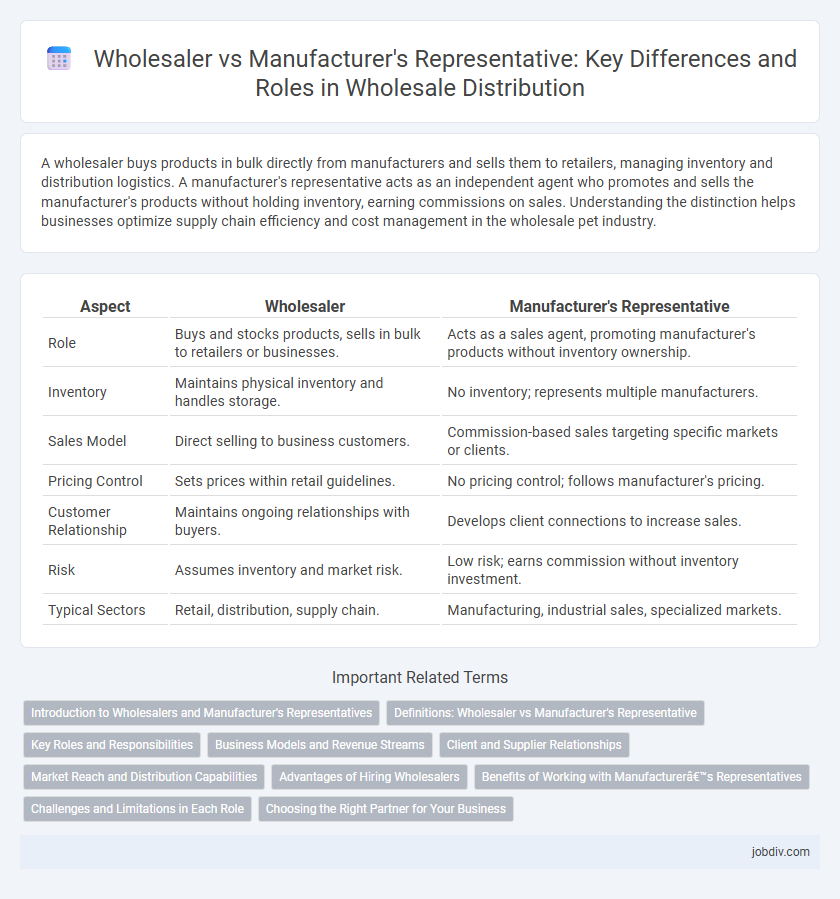A wholesaler buys products in bulk directly from manufacturers and sells them to retailers, managing inventory and distribution logistics. A manufacturer's representative acts as an independent agent who promotes and sells the manufacturer's products without holding inventory, earning commissions on sales. Understanding the distinction helps businesses optimize supply chain efficiency and cost management in the wholesale pet industry.
Table of Comparison
| Aspect | Wholesaler | Manufacturer's Representative |
|---|---|---|
| Role | Buys and stocks products, sells in bulk to retailers or businesses. | Acts as a sales agent, promoting manufacturer's products without inventory ownership. |
| Inventory | Maintains physical inventory and handles storage. | No inventory; represents multiple manufacturers. |
| Sales Model | Direct selling to business customers. | Commission-based sales targeting specific markets or clients. |
| Pricing Control | Sets prices within retail guidelines. | No pricing control; follows manufacturer's pricing. |
| Customer Relationship | Maintains ongoing relationships with buyers. | Develops client connections to increase sales. |
| Risk | Assumes inventory and market risk. | Low risk; earns commission without inventory investment. |
| Typical Sectors | Retail, distribution, supply chain. | Manufacturing, industrial sales, specialized markets. |
Introduction to Wholesalers and Manufacturer's Representatives
Wholesalers purchase bulk products directly from manufacturers to sell in smaller quantities to retailers or businesses, facilitating efficient distribution and inventory management. Manufacturer's representatives act as independent sales agents who promote and sell a manufacturer's products to wholesalers and retailers, bridging the gap without holding inventory. Both play crucial roles in the supply chain, enabling manufacturers to expand market reach while ensuring product availability.
Definitions: Wholesaler vs Manufacturer's Representative
A wholesaler purchases large quantities of goods directly from manufacturers and sells them to retailers or other businesses, acting as an intermediary in the supply chain. A manufacturer's representative, also known as a sales agent, works on behalf of manufacturers to promote and sell products to wholesalers or retailers without taking ownership of the inventory. Wholesalers manage inventory and distribution, while manufacturer's representatives focus on sales and customer relationships.
Key Roles and Responsibilities
Wholesalers manage inventory, purchase goods in bulk from manufacturers, and distribute products to retailers or other buyers, ensuring efficient supply chain operations. Manufacturer's representatives act as independent agents, promoting and selling manufacturers' products while building customer relationships and providing market feedback. Both roles are vital in connecting production with the end market but differ in ownership, risk, and sales approach.
Business Models and Revenue Streams
Wholesalers purchase bulk products from manufacturers and resell them to retailers or businesses, generating revenue through markup on volume sales and inventory management. Manufacturer's representatives act as independent sales agents, earning commissions based on sales without holding inventory, which reduces overhead costs. This difference in business models highlights wholesalers' reliance on stock ownership for profit, while manufacturer's representatives focus on sales performance and relationship management.
Client and Supplier Relationships
A wholesaler maintains direct inventory ownership and manages bulk sales to clients, fostering long-term supplier relationships through consistent order fulfillment and pricing control. A manufacturer's representative acts as an intermediary, representing multiple suppliers without holding inventory, building client rapport by offering diverse product options and customized solutions. Both roles prioritize effective communication and trust to enhance supplier-client collaboration and drive sales growth.
Market Reach and Distribution Capabilities
Wholesalers typically possess extensive market reach by directly purchasing large quantities of products and distributing them across diverse retail channels, ensuring widespread availability. Manufacturer's representatives specialize in sales and product promotion, leveraging personal relationships to penetrate niche markets without holding inventory themselves. Wholesalers excel in broad distribution logistics, while manufacturer's representatives focus on targeted market access and brand representation.
Advantages of Hiring Wholesalers
Hiring wholesalers offers significant advantages such as access to bulk purchasing power, leading to lower costs and streamlined inventory management. Wholesalers provide established distribution networks that ensure faster delivery and reduced logistics complexities compared to relying on multiple manufacturers' representatives. Their broad market knowledge enables businesses to respond to demand fluctuations efficiently, improving overall supply chain resilience.
Benefits of Working with Manufacturer’s Representatives
Working with Manufacturer's Representatives offers direct access to specialized product knowledge and personalized customer service, enhancing the efficiency of wholesale operations. Their established relationships with manufacturers enable faster order processing and improved product availability, reducing supply chain delays. This partnership also provides market insights and competitive pricing strategies, helping wholesalers optimize inventory management and drive sales growth.
Challenges and Limitations in Each Role
Wholesalers face challenges in inventory management and maintaining competitive pricing while balancing bulk purchasing risks and storage costs. Manufacturer's representatives encounter limitations in controlling product quality and delivery timelines, as they do not handle production directly, impacting customer satisfaction. Both roles must navigate complex market demands and communication barriers to ensure efficient supply chain operations.
Choosing the Right Partner for Your Business
Selecting the right partner between a wholesaler and a manufacturer's representative depends on your business goals and distribution needs. Wholesalers typically offer bulk purchasing options and inventory management, ideal for companies seeking large quantity orders at competitive prices. Manufacturer's representatives provide personalized sales expertise and market access without holding inventory, benefiting businesses focused on expanding market reach and building strong customer relationships.
Wholesaler vs Manufacturer's Representative Infographic

 jobdiv.com
jobdiv.com